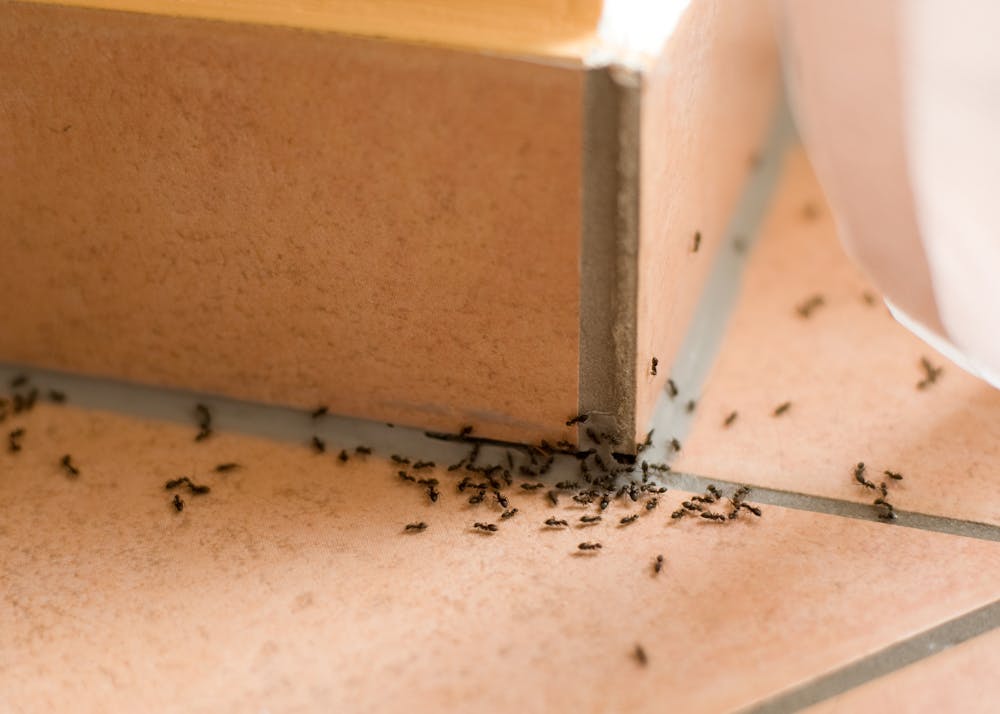Are you suddenly finding tiny ants in your kitchen? The reason for a sudden ant infestation kitchen is usually because they’ve found a new food source, water source, or a comfortable place to nest. The good news is that, with a bit of detective work and persistence, you can eliminate them.

Image Source: images.theconversation.com
Deciphering the Sudden Appearance of Small Ants in Your House
Discovering small ants appearing kitchen can be frustrating. It feels like they materialized out of nowhere. To combat this issue effectively, it’s essential to understand why they’re there in the first place. Several factors can lead to a kitchen ant problem cause.
Common Culprits Behind the Invasion
Here’s a look at the most frequent reasons for a sudden appearance of small ants in house:
- Food Spills and Crumbs: Ants are attracted to sugary, greasy, and protein-rich foods. Even a tiny spill of honey or a few crumbs left on the counter can be a feast for them.
- Water Sources: Leaky faucets, damp areas under sinks, and pet bowls can provide essential water for ants, especially during dry seasons.
- Easy Access Points: Cracks in walls, gaps around pipes, and openings in windows and doors offer easy entry points for ants to invade your kitchen.
- Unsealed Food Containers: Leaving food in open containers or bags provides a direct invitation to ants.
- Dirty Dishes: Piles of dirty dishes in the sink offer a smorgasbord of food particles that attract ants.
- Pet Food: Pet food bowls are a common attractant. Uneaten food can quickly become a magnet for ants.
- Weather Changes: Ants may seek shelter indoors during extreme weather conditions like heavy rain or drought.
Fathoming Ant Behavior
Ants are social creatures and rely on pheromone trails to communicate and guide each other to food sources. When one ant finds food in your kitchen, it leaves a scent trail for others to follow, leading to a full-blown infestation. The tiny ants in kitchen reason is often this efficient communication system. This is also often why am I seeing ants in kitchen constantly.
Identifying the Type of Ant
Before you start trying to get rid of them, figure out what kind of ant you are dealing with. This will affect your plan. Some common types of tiny ants found in kitchens include:
- Pharaoh Ants: Small, yellowish ants that are difficult to control and often require professional help.
- Argentine Ants: Dark brown or black ants that are highly adaptable and can form large colonies.
- Odorous House Ants: These ants emit a foul odor when crushed and are attracted to sweets.
- Pavement Ants: Brownish-black ants that nest in cracks in sidewalks and driveways and can enter homes in search of food.
Tracking Down the Kitchen Ants Source
Finding where are tiny ants coming from kitchen is crucial for long-term control. Follow these steps to locate their entry points and nest:
- Observe Ant Trails: Watch where the ants are traveling to and from. This will lead you to their entry point and potentially their nest.
- Inspect Common Entry Points: Check for cracks in walls, gaps around pipes, and openings in windows and doors.
- Look for Nests: Ants may nest in walls, under floors, or in cabinets. Look for piles of dirt or debris that indicate a nest.
- Check Outdoors: The kitchen ants source might be outside your home. Look for ant mounds or trails leading towards your house.
Natural Remedies to Get Rid of Kitchen Ants
If you want to avoid harsh chemicals, several natural remedies can effectively deter ants.
- Vinegar: Mix equal parts white vinegar and water in a spray bottle. Spray ant trails, entry points, and directly on ants to kill them.
- Lemon Juice: Spraying lemon juice around entry points and ant trails can disrupt their scent trails.
- Cinnamon: Sprinkle cinnamon powder or place cinnamon sticks near entry points. Ants dislike the smell of cinnamon.
- Peppermint Oil: Mix a few drops of peppermint oil with water in a spray bottle and spray around entry points and ant trails.
- Diatomaceous Earth (DE): This natural powder is made from fossilized algae and is deadly to ants. Sprinkle it around entry points and ant trails. Make sure to use food-grade DE.
- Borax and Sugar: Mix borax with sugar and water to create a bait. Ants will carry the bait back to their colony, killing them. Be careful when using borax around pets and children.
Effective Strategies on How to Get Rid of Tiny Kitchen Ants
Here are some detailed steps on how to get rid of tiny kitchen ants:
1. Thorough Cleaning
- Wipe Down Surfaces: Clean countertops, tables, and floors with soap and water or a vinegar solution to remove food residue and ant trails.
- Sweep and Mop Regularly: Sweep and mop your kitchen floor regularly to remove crumbs and spills.
- Wash Dishes Promptly: Wash dishes immediately after use to prevent food from attracting ants.
- Empty Trash Cans: Empty trash cans regularly and keep them tightly sealed.
- Clean Appliances: Clean under and behind appliances like refrigerators and stoves to remove hidden food debris.
2. Sealing Entry Points
- Caulk Cracks and Gaps: Use caulk to seal cracks in walls, gaps around pipes, and openings in windows and doors.
- Weatherstrip Doors and Windows: Install weatherstripping around doors and windows to create a tight seal.
- Repair Leaks: Fix leaky faucets and pipes to eliminate water sources that attract ants.
3. Using Ant Baits
- Commercial Ant Baits: Place commercial ant baits near ant trails and entry points. Ants will carry the bait back to their colony, killing them.
- DIY Borax Baits: Mix borax with sugar and water to create a bait. Place the bait in shallow containers near ant trails.
- Monitor Bait Stations: Check bait stations regularly and replenish them as needed.
4. Insecticides
- Spray Insecticides: Use spray insecticides to kill ants directly and to create a barrier around entry points. Be cautious when using insecticides around food, pets, and children.
- Dust Insecticides: Apply dust insecticides in cracks and crevices where ants may be hiding.
- Professional Pest Control: If you’ve tried other methods and are still dealing with an ant infestation, consider hiring a professional pest control company.
Preventive Measures to Avoid Future Infestations
Once you’ve eliminated the ants, take these steps to prevent them from returning:
- Store Food Properly: Store food in airtight containers to prevent ants from accessing it.
- Clean Up Spills Immediately: Clean up spills and crumbs immediately to remove food sources.
- Maintain a Clean Kitchen: Keep your kitchen clean and clutter-free to prevent ants from being attracted.
- Seal Entry Points: Seal cracks and gaps in walls, windows, and doors to prevent ants from entering.
- Trim Vegetation: Trim bushes and trees near your home to prevent ants from using them as bridges to enter your house.
- Monitor for Ant Activity: Regularly check for ant activity and take action immediately if you see any signs of infestation.
The Mystery of Getting Ants in Kitchen Overnight
It might seem impossible, but getting ants in kitchen overnight is common. This happens because ants are most active at night when it’s cooler and there’s less activity in the kitchen. They follow scent trails to food sources and can quickly establish a presence overnight.
Table: Comparing Ant Control Methods
| Method | Description | Pros | Cons |
|---|---|---|---|
| Vinegar | Mix equal parts vinegar and water and spray on ants and trails. | Natural, inexpensive, readily available | May not be effective for large infestations, strong odor |
| Lemon Juice | Spray lemon juice around entry points and ant trails. | Natural, pleasant scent, readily available | May not be effective for large infestations |
| Cinnamon | Sprinkle cinnamon powder or place cinnamon sticks near entry points. | Natural, pleasant scent, readily available | May not be effective for large infestations |
| Peppermint Oil | Mix peppermint oil with water and spray around entry points and ant trails. | Natural, pleasant scent, readily available | May not be effective for large infestations |
| Diatomaceous Earth | Sprinkle food-grade diatomaceous earth around entry points and ant trails. | Natural, effective, long-lasting | Can be messy, may irritate skin and lungs |
| Borax Bait | Mix borax with sugar and water to create a bait. | Effective, targets the entire colony | Can be dangerous to pets and children, requires patience |
| Insecticides | Spray insecticides directly on ants and around entry points. | Fast-acting, effective for large infestations | Can be toxic, may require professional application |
| Professional Pest Control | Hiring a pest control company to eliminate ants. | Effective, comprehensive, saves time and effort | Can be expensive |
Frequently Asked Questions (FAQ)
Q: What attracts tiny ants to my kitchen?
A: Tiny ants are attracted to food spills, crumbs, water sources, and easy access points like cracks in walls and gaps around pipes.
Q: Can I get rid of ants myself, or do I need a professional?
A: You can often get rid of ants yourself using natural remedies, baits, and cleaning. However, for severe infestations or if you’re dealing with difficult-to-control species like Pharaoh ants, professional help may be necessary.
Q: What is the best way to find where ants are coming from?
A: Follow ant trails to identify their entry points. Check for cracks in walls, gaps around pipes, and openings in windows and doors. Look for nests in walls, under floors, or in cabinets.
Q: Are natural ant control methods effective?
A: Yes, natural ant control methods like vinegar, lemon juice, cinnamon, peppermint oil, and diatomaceous earth can be effective for deterring ants. However, they may not be sufficient for large infestations.
Q: How can I prevent ants from coming back?
A: Store food properly, clean up spills immediately, maintain a clean kitchen, seal entry points, trim vegetation, and monitor for ant activity.
Q: Is it normal to see ants in my kitchen only at night?
A: Yes, it’s common to see ants in your kitchen at night because they are most active during cooler temperatures and when there’s less activity.
Q: What should I do if I have a sudden increase in the number of ants in my kitchen?
A: Clean your kitchen thoroughly, identify and eliminate food and water sources, seal entry points, and use ant baits or insecticides. If the problem persists, consider hiring a professional pest control company.
By following these tips and strategies, you can effectively eliminate tiny ants from your kitchen and prevent future infestations. Remember that persistence and thoroughness are key to successful ant control.

Hi, I’m Larry Fish, the mind behind MyGrinderGuide.com.. With a passion for all things kitchen appliances, I created this blog to share my hands-on experience and expert knowledge. Whether it’s helping you choose the right tools for your culinary adventures or offering tips to make your kitchen more efficient, I’m here to guide you. My goal is to make your time in the kitchen not only easier but also enjoyable! Welcome to my world of kitchen mastery!
